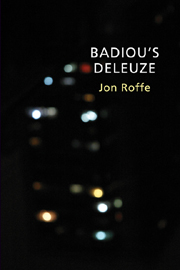7 - Thought and the subject
Summary
ACTIVE AND PASSIVE, THOUGHT AND BEING
In the methodological passages near the start of The Clamor of Being, Badiou argues that any familiarity with Deleuze's thought will reveal that “one could draw up an endless list of the conceptual couples that are organized according to this paramount formal opposition of the active and the passive”, and claims that “this duality clearly runs throughout Deleuze's entire work” (DCB 33/52). For Badiou, though, this level of organization of the Deleuzean text must, however, only be treated as rhetorical or preliminary in nature. Thus he adds that “The active/passive duality indisputably exercises a strong influence on Deleuze's philosophical language or, let's say, his spontaneous rhetoric. Nonetheless, it is just as unquestionable that Deleuze does everything in his power to escape from this influence” (DCB 33–4/53). Whether or not this is true of Deleuze's rhetoric, what is certain is that Badiou, rather than following what he considers Deleuze's lead on this front, persists in organizing his reading around this opposition: not on a rhetorical level, but rather on the level of concepts themselves.
Being and power
This is perhaps most notable with respect to the categories of the virtual and the actual, where Badiou's principle thesis about Deleuze (the primacy of the One) leads him to assert that the virtual is, as we have already seen, the supreme name for Being in Deleuze's work, associated with plenitude, ultimate ontological status and activity. In comparison, the actual is the regime of passive products.
Information
- Type
- Chapter
- Information
- Badiou's Deleuze , pp. 128 - 159Publisher: Acumen PublishingPrint publication year: 2011
